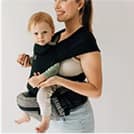How to Bond with Baby While Breastfeeding
Written by Connor Bringas on February 24, 2023.
Bonding has proven to play an important role in baby development and emotional health. One of the strongest bonding moments mothers experience comes from breastfeeding their babies. In this blog, we’ll review how to bond with a baby while breastfeeding and how you can make the most of the experience.
Because such a special bonding moment shouldn’t be hindered by discomfort, use your Tushbaby Carrier to prevent aches and pains associated with breastfeeding. Your Tushbaby Carrier will be the best tool to provide added relief and comfort to make bonding during breastfeeding even more comfortable and rewarding.
Bonding with Baby While Breastfeeding
Table of Contents
- Do breastfed babies bond more with mothers?
- Should I talk to baby while breastfeeding?
- What age do babies get attached to mom?
- How do I keep my baby's attention when breastfeeding?
- Is eye contact important while breastfeeding?
- Skin-to-skin and oxytocin for bonding while breastfeeding
- Does a mother’s voice help baby to bond while breastfeeding?
- Does touch influence bonding with baby while breastfeeding?
- Does my scent help baby bond while breastfeeding?
Do breastfed babies bond more with mothers?
While there are plenty of ways babies and mothers bond, breastfeeding is one of the experiences that can aid in creating a powerful connection between mothers and their babies. This strong bond can be due to the additional time mothers spend holding their babies with skin-to-skin contact and stroking.
During breastfeeding, bonding can occur much more naturally when both baby and mother are relaxed. Having support during feedings can help create a much more comfortable experience, which is why many mothers use nursing pillows or baby carriers. The Tushbaby Carrier can help promote proper breastfeeding posture and provide much-needed back and arm support, meaning you can enjoy bonding with your baby. Not to mention, the Tushbaby Carrier is much more ideal than a nursing pillow when nursing in public.
Should I talk to baby while breastfeeding?
Talking to your baby while breastfeeding is a great way to encourage bonding. Speaking to your baby in a calm voice can promote relaxation as your baby hears the soothing sound of their mother’s voice that they have come to know well. This intimate moment of breastfeeding while you talk can help build a relationship between you and your baby as they get to know you. After spending months and months anticipating meeting your baby, the time has come to share everything about the world with them, and no better time than while they are quiet and relaxed on your chest.
What age do babies get attached to mom?
While bonding moments start when your baby is born, it’s normal to feel like it’s taking some time for your baby to connect to you. No baby is the same, but mothers usually notice this attachment to mom around 3-6 months of age. With attachment, your baby may begin to recognize you, have special responses just for you, and look for your specific attention in times of distress.
As we said earlier, one of the strongest connections mothers experience when bonding with their babies is from breastfeeding. If you’re a dad, you may be wondering what you can do to promote that same level of connection with your baby. Don’t worry, dad; there are many ways that you can enjoy this magical experience of bonding with your baby too! Read more about how to help Dad bonding with baby here.
How do I keep my baby's attention when breastfeeding?
Breastfeeding doesn't always involve a calm baby with one mission in mind (aka, milk). Sometimes you may find yourself with a distracted baby, especially as they get older and are more engaged with their surroundings. With many distractions, there are ways you can keep your baby focused on feeding. Feeding in a quiet or dark room can help keep your baby’s attention by removing additional stimulation from their environment. Another important part of bonding while breastfeeding that can help keep your baby’s attention is eye contact.
Is eye contact important while breastfeeding?
Babies will certainly benefit from eye contact during breastfeeding or bottle feeds. Eye contact helps promote cognitive development for your baby and plays a significant role in bonding during feeding time. Smiling at your baby and speaking in soothing voices can also help catch your baby’s eye. It’s normal for babies to break eye contact while feeding, so don’t be discouraged if this happens. Just be available for more gazes once they’re ready.
Skin-to-skin and oxytocin for bonding while breastfeeding
One reason breastfeeding provides an intimate bonding moment for mothers and their babies is due to the skin-to-skin contact and release of the hormone oxytocin. This hormone, also known as the love hormone, helps calm and warm mothers’ bodies. This stress relief for moms comes with providing a friendly and snuggly place for their baby to feed.
Does a mother’s voice help baby to bond while breastfeeding?
Babies have been shown to prefer their mother's voice. Speaking to your baby while feeding can help keep them calm as they begin to recognize the familiar (and oh so soothing) sound that is mom.
Does touch influence bonding with baby while breastfeeding?
Touch is just one of the many ways breastfeeding can be a positive bonding experience for you and your baby. We’ve shared how the hormone oxytocin plays a role in strengthening bonding experiences with skin-to-skin contact. Other touches, like stroking your baby’s head, can help calm and keep your baby engaged while feeding too. Having a free hand while feeding will also be key to encouraging more soothing touches with your baby. Using the Tushbaby Carrier can provide your back and arms with extra support to relax and enjoy special moments with your baby during feedings.
Does my scent help baby bond while breastfeeding?
Research has shown that babies are attracted to the smell of their mothers. It’s actually one of the first ways a baby comes to recognize their mother, proven by the natural attraction babies have to their mothers' breasts after birth. A mother’s familiar scent can help calm a baby and make for an even more enjoyable bonding experience while breastfeeding.









Leave a comment